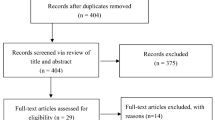Abstract
The paper outlines the advantages and disadvantages of using the Internet to collect data from gamblers, predominantly online gamblers. Drawing from experience of a number of studies carried out online by the authors and by reviewing the available literature, the authors discuss the main issues concerning data collected using computers and the Internet. The paper examines a number of areas including; recruiting and utilising participants, validity, suitable methods of data collection (i.e., questionnaire studies, online tests, participant observation, online interviews) and ethical issues. It is concluded that online research methods can be a useful way of examining the psychosocial aspects of online gambling and in some cases even traditional gambling activities.


Similar content being viewed by others
Notes
For a good detailed example of online participant observation, albeit in a non-gambling environment, see Suler’s (1996) study of The Palace discussion group.
References
Ashworth, J., Doyle, N., & Howat, N. (2000). Under 16s and the National Lottery: Tracking Survey July 2000, BMRB International Ltd. London: The National Lottery Commission: Located at: http://www.natlotcomm.gov.uk/uploadedFiles/trackingsurvey.pdf.
Bampton, R., & Cowton, C. J. (2002). The e-interview. Forum: Qualitative Social Research [Online Journal], 3(2). Available at http://www.qualitative-research.net/fqs/fqs-eng.htm [Date accessed: 08/27/2003].
Barak, A., & English, N. (2002). Prospects and limitations of psychological testing on the Internet. Journal of Technology in Human Services, 19, 65–89.
Bruckman, A. S. (1993). Gender swapping on the internet. Paper presented at The Internet Society (INET ‘93) in San Fransisco, California.
Campbell, K. A., Rohlman, D. S., Storzbach, D., Binder, L. M., Anger, W. K., Kovera, C. A., et al. (1999). Test–retest reliability of psychological and neurobehavioral tests self-administered by computer. Assessment, 6, 21–32.
Chappell, D., Eatough, V. E., Davies, M. N. O., & Griffiths, M. D. (2006). EverQuest—It’s just a computer game right? An interpretative phenomenological analysis of online gaming addiction. International Journal of Mental Health and Addiction, 4, 205–216.
DiLalla, D. L. (1996). Computerized administration of the Multidimensional Personality Questionnaire. Assessment, 3, 365–374.
Griffiths, M. D. (2000). Does Internet and computer “addiction” exist? Some case study evidence. CyberPsychology and Behavior, 3, 211–218.
Griffiths, M. D., & Davies, M. N. O. (2002). Excessive online gaming: Implications for education. Journal of Computer Assisted Learning, 18, 379–381.
Griffiths, M. D., Davies, M. N. O., & Chappell, D. (2003). Breaking the stereotype: The case of online gaming. CyberPsychology and Behavior, 6, 81–91.
Griffiths, M. D., Davies, M. N. O., & Chappell, D. (2004a). Demographic factors and playing variables in online computer gaming. CyberPsychology and Behavior, 7, 479–487.
Griffiths, M. D., Davies, M. N. O., & Chappell, D. (2004b). Online computer gaming: A comparison of adolescent and adult gamers. Journal of Adolescence, 27, 87–96.
Gupta, R., & Derevensky, J. L. (1998). Adolescent gambling behaviour: A prevalence study and examination of the correlates associated with problem gambling. Journal of Gambling Studies, 14, 319–345.
Holge-Hazelton, B. (2002). The Internet: A new field for qualitative inquiry. Forum: Qualitative Social Research [Online Journal], 3(2). Available at http://www.qualitative-research.net/fqs/fqs-eng.htm [Date accessed: 08/12/2003].
Howard, G. S. (1994). Why do people say nasty things about self-reports? Journal of Organizational Behavior, 15, 399–404.
Husserl, E. (1970). The Crisis of European Sciences and Transcendental Phenomenology: An Introduction to Phenomenology. Translated by David Carr. Evanston, IL: Northwestern University Press.
Kiesler, S., Siegal, J., & McGuire, T. W. (1984). Social psychological aspects of computer mediated communication. American Psychologist, 39, 1123–1134.
Ladd, G. T., & Petry, N. M. (2002). Disordered gambling among university based medical and dental patients: A focus on internet gambling. Psychology of Addictive Behaviors, 16, 76–79.
Newell, R. (1993). Questionnaires. In N. Gilbert (Ed.), Researching Social Life (pp. 96–97). London: Sage.
Neuman, G., & Baydoun, R. (1998). Computerization of paper-and-pencil tests: When are they equivalent? Applied Psychological Measurement, 22, 71–83.
O’Connell, R (2001). Be somebody else but be yourself at all times: Degrees of identity deception in chatrooms. Located at: http://www.once.uclan.ac.uk/print/deception_print.htm [Date accessed 06/01/04].
Parke, A., Griffiths, M., & Parke, J. (2005). Can playing poker be good for you? Poker as a transferable skill. Journal of Gambling Issues, 14. Available at http://www.camh.net/egambling/issue14/jgi_14_parke.html.
Suler, J. (1996). One of us: Participant observation research at the palace http://www.rider.edu/~suler/psycyber/partobs.html [Date accessed 06/07/05].
Walther, J. B. (1996). Computer mediated communication: Impersonal, interpersonal, and hyperpersonal interaction. Communication Research, 23, 3–43.
Wood, R. T. A., & Griffiths, M. D. (1998). The acquisition, development and maintenance of lottery and scratchcard gambling in adolescence. Journal of Adolescence, 21, 265–273.
Wood, R. T. A., & Griffiths, M. D. (2004). Adolescent lottery and scratchcard players: Do their attitudes influence their gambling behaviour? Journal of Adolescence, 27, 467–475.
Wood, R. T. A., Griffiths, M. D., Chappell, D., & Davies, M. N. O. (2004). The structural characteristics of video games: A psycho-structural analysis. CyberPsychology and Behavior, 7, 1–10.
Author information
Authors and Affiliations
Corresponding author
Rights and permissions
About this article
Cite this article
Wood, R.T.A., Griffiths, M.D. Online Data Collection From Gamblers: Methodological Issues. Int J Ment Health Addiction 5, 151–163 (2007). https://doi.org/10.1007/s11469-007-9055-y
Received:
Accepted:
Published:
Issue Date:
DOI: https://doi.org/10.1007/s11469-007-9055-y



